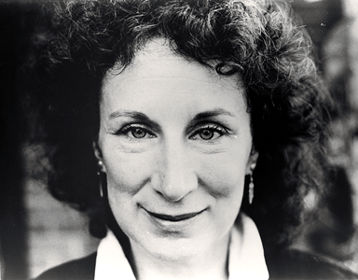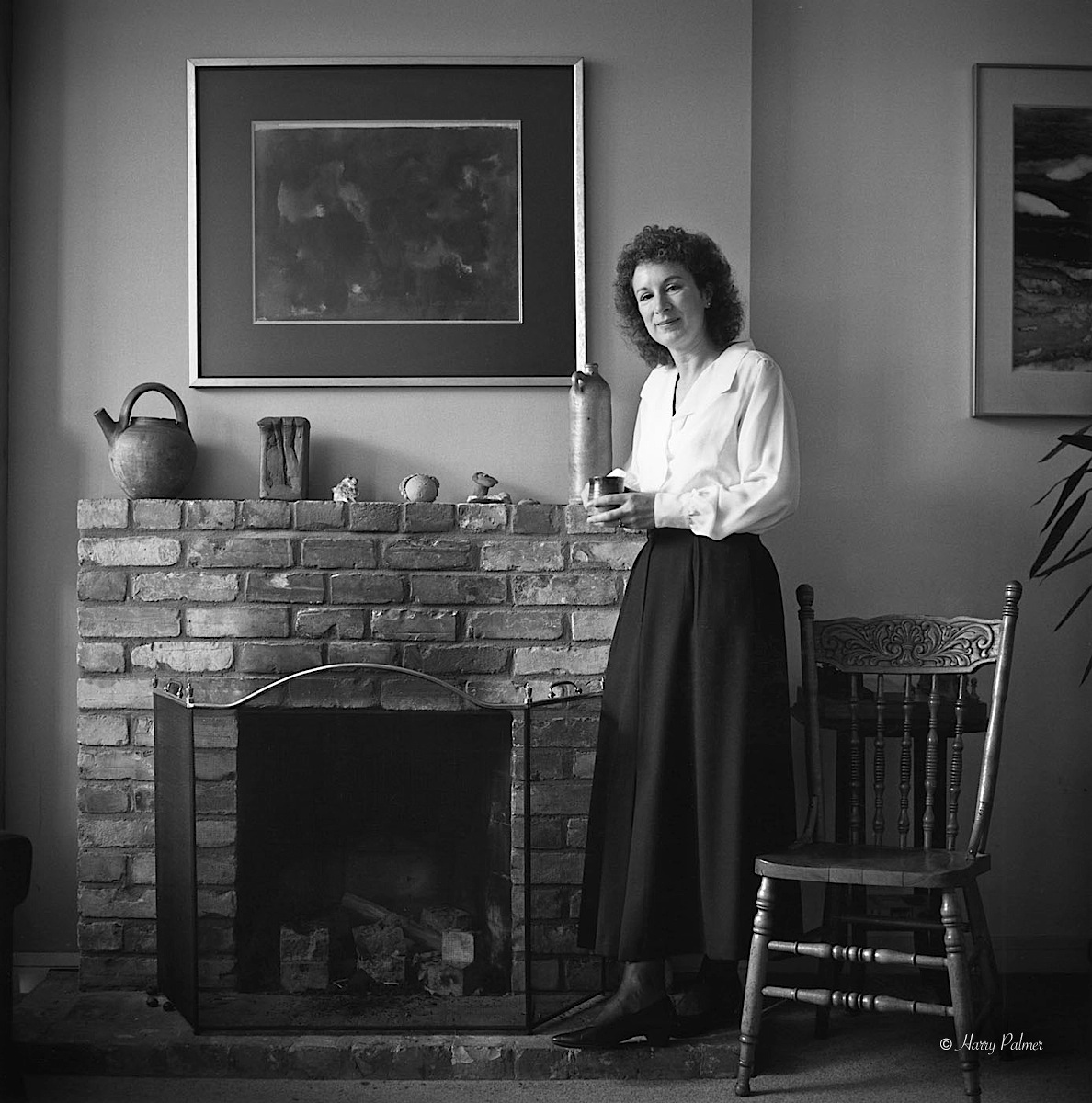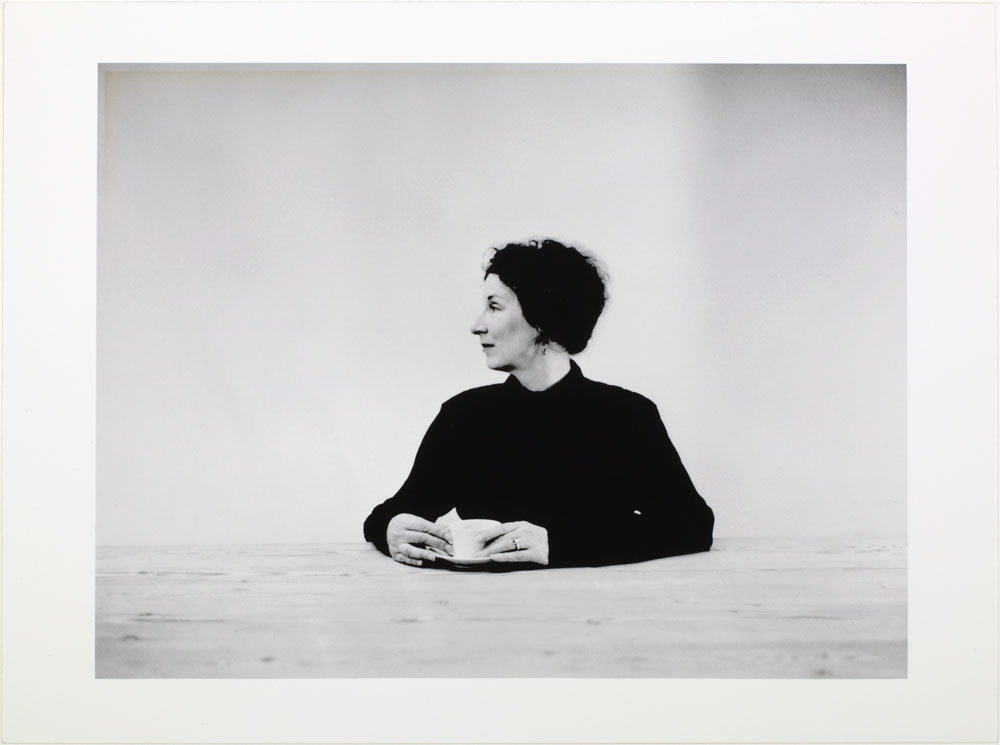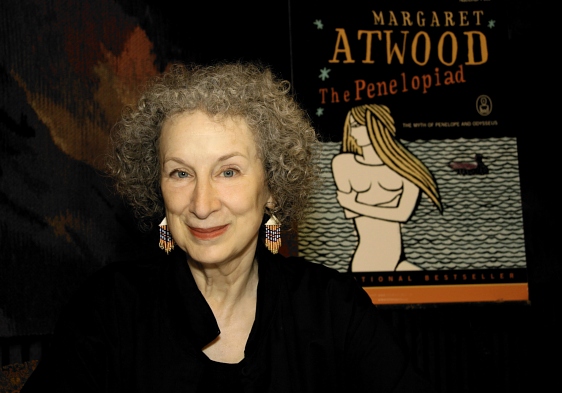Margaret Eleanor Atwood, CC, O Ont, FRSC, poet, novelist, critic, professor (born 18 November 1939 in Ottawa, ON). A varied and prolific writer, Margaret Atwood is among the most celebrated authors in Canadian history. Her writing is noted for its careful craftsmanship and precision of language, which lend a sense of inevitability and a resonance to her words. In her fiction, Atwood has explored the issues of our time, capturing them in the satirical, self-reflexive mode of the contemporary novel. She has written 14 novels, nine short-story collections, 16 books of poetry, and 10 volumes of non-fiction. She has received two Governor General’s Literary Awards, two Booker Prizes, a Scotiabank Giller Prize, and numerous other honours and accolades. She is a Companion of the Order of Canada and a Chevalier of the l'Ordre des Arts et des Lettres of France.

Education and Early Career
Margaret Atwood studied English, with minors in philosophy and French, at the University of Toronto (1957–61). She obtained an MA at Radcliffe College, Harvard in 1962. The influence of professors Jay MacPherson and Northrop Frye directed her early poetry toward myth and archetype in her first book, Double Persephone (1961). Atwood's reputation as a poet was established when her second book, The Circle Game (1966), was awarded the Governor General's Literary Award for poetry.
In 1969, Atwood published her first novel, The Edible Woman. Its themes of women's alienation echo those in her poetry, which continued with Procedures for Underground (1970), The Journals of Susanna Moodie (1970), and Power Politics (1971). In the latter, words become a refuge for weak women against male force.
Teaching Career
Atwood also had a distinguished teaching career. She held positions at the University of British Columbia (1964–65), Sir George Williams University (1967–68; now Concordia University), and York University (1971–72).
1970s
In the 1970s, Atwood was involved with nationalist cultural concerns as an editor for House of Anansi Press (1971–73) and as an editor and political cartoonist for This Magazine. She published Survival: A Thematic Guide to Canadian Literature in 1972. When first released, it was considered the most original book ever written about Canadian literature. In Survival, Atwood argues that the central theme of Canadian literature and Canadian culture as a whole is survival; whether that is against the forces of nature or the forces of history. She also argues that the central character type in this paradigm is the victim, and that this poses a problem for the development of a distinctive and positive Canadian identity. Since its publication, Survival has continued to be read and taught at the university level. It continues to shape the way Canadians look at their cultural heritage.
Also in 1972, Atwood’s novel Surfacing was published. In it, Atwood casts the conflict between technology and nature in political terms. As in Atwood’s other novels, the protagonist goes through an archetypal retreat to the irrational — in this case the wilderness, where she undergoes a transformation through contact with Indigenous and Quebec cultures — before reintegrating into society.

Continued critical success greeted the publication of You Are Happy (1974). It includes a reworking of The Odyssey from Circe's perspective. Atwood’s third novel, Lady Oracle (1976), was a parody of fairy tales and Gothic romances. It won the 1977 City of Toronto Book Award and a Canadian Booksellers Association Award.
In this period, Atwood also worked less successfully in new genres. She wrote several television scripts, including “The Servant Girl” (CBC, 1974), and a history, Days of the Rebels: 1815-1840 (1977). Her short-story collection Dancing Girls (1977) attracted more positive notice, winning the Periodical Distributors of Canada Short Fiction Award.
Two books followed in 1978: Two-Headed Poems, which continued Atwood’s exploration of the duplicity of language; and the children's book Up in the Tree. Life Before Man (1979) is a more traditional novel than her earlier fiction. It develops a series of love triangles through exposition rather than through poetic image.
1980s
In 1980, Margaret Atwood became vice-chair of the Writers' Union of Canada. She worked on a television drama, Snowbird (CBC, 1981), and co-published another children's book, Anna's Pet (1980), with Joyce Barkhouse. It was adapted for stage by the Mermaid Theatre (1986).
Always interested in civil liberties, Atwood was active over several years in Amnesty International. This had an impact on the subject matter of True Stories, a book of poetry, and Bodily Harm, a novel published in 1981. In both works, Atwood “bears witness,” breaking down distinctions she makes between poetry (at the heart of her relationship with language) and fiction (her moral vision of the world). She continued her fight against literary censorship as president of PEN International's Anglo-Canadian branch from 1984 to 1986. She edited The CanLit Foodbook (1987) on that organization’s behalf.
Atwood's collected criticism, Second Words (1982), contains some of the earliest feminist criticism written in Canada. Her editorship of the revised Oxford Book of Canadian Poetry (1982) marked her central position among Canadian poets of her generation. Her short story collection Bluebeard's Egg (1983) won the Periodical Distributors of Canada and the Foundation for the Advancement of Canadian Letters Book of the Year Award.

Murder in the Dark (1983), a collection of experimental prose poems and short fictions, drew accolades for its use of language and the way it dissolves the traditional boundaries between fiction and poetry. Atwood continued to alternate prose with poetry with Interlunar (1984). It was followed by Selected Poems II: Poems Selected & New, 1976–1986 (1986).
However, the international critical and popular success of The Handmaid's Tale (1985) brought Atwood greater renown and financial success as a novelist. It won the Governor General's Literary Award, the Los Angeles Times Prize, the Arthur C. Clarke Award for Science Fiction and the Commonwealth Literary Prize. It was also shortlisted for the Booker Prize (UK) and the Ritz-Paris-Hemingway Prize (Paris).
The year 1987 brought successes in new literary ventures: the script for “Heaven on Earth,” a television movie about British home children in Canada; and The Festival of Missed Crass, a fantastic and satirical children's story transformed into a musical for Toronto’s Young People's Theatre.
Cat's Eye (1988), a novel about a visual artist probing questions of subjectivity, creation and temporality, broke literary ground for its exploration of the realm of childhood, with its shifts of power, its secrecies and betrayals. The book received popular and critical acclaim, including the 1989 City of Toronto Book Award; the Coles Book of the Year Award; and the Canadian Booksellers Association Author of the Year Award. Cat's Eye was also shortlisted for the Booker Prize. Atwood's international stature as a fiction writer was further confirmed with co-editorship of The Best American Short Stories (1989).
1990s
New collections of Atwood’s poetry appeared in Canada and England with Selected Poems 1966-1984 (1990), followed by Margaret Atwood: Poems 1965-1975 (1991). Wilderness Tips (1991) received the 1992 Trillium Book Award and the Book of the Year Award from the Periodical Marketers of Canada. It contains stories with Gothic overtones about women facing middle age, as well as tales about confrontations with the wilderness. Good Bones (1992) features brief texts about female body parts and social constraints written with devastating wit. They were adapted for the stage by Clare Coulter in 1998.
After two books of short fiction, Atwood published one of her most intricate novels, The Robber Bride (1993). It examines Toronto lifestyles and women's friendships. In the novel, three friends reflect upon their deceased university classmate, Zenia, who had stolen each of their boyfriends. Zenia, it turns out, had given them each a different life story, and in the end, neither the characters, nor the reader, knows the ultimate truth. The novel won the 1993 Canadian Authors Association Novel of the Year Award, the Commonwealth Prize for Canadian and Caribbean Region, and the 1994 Trillium Award. It was adapted as a CBC TV movie in 2007.
In 1995, Atwood published Morning in the Burned House, her first collection of new poems in a decade. It includes a sequence of elegiac poems, demonstrating a new emotional range in her work. Eating Fire: Selected Poems, 1965–1995 was published by Virago Press in 1998.
Atwood did not abandon her original literary interests in this period, but rather added a darker shading. This is evident in her literary criticism, such as Strange Things: The Malevolent North in Canadian Literature (1996). It was delivered as the Clarendon Lectures in English Literature at Oxford University in 1991. Despite the many transformations in Canadian literature — especially its predominantly urban orientation since Survival was published in 1972 — Atwood pursues her obsession with the wilderness theme in the Canadian imagination. She also examines images connected with the Canadian North, beginning with the image of cannibalism in relation to the doomed Franklin expedition.
In 1996, Atwood published her highly acclaimed novel Alias Grace, a historical novel about Grace Marks, an Irish Canadian maid who was convicted of killing her employers in 1843. Extensive archival research into the life and times of Marks led Atwood to revise her earlier perspective on her and to question Susanna Moodie's opinion in Life in the Clearings (which Atwood had adapted in her 1974 TV script, “The Servant Girl”). Atwood weaves together Marks's first-person fictional voice with 19th-century journalistic accounts and interviews, letters, traditional patchwork designs and poetry.
Atwood's novel raises important questions about truth-telling and representation. How can we ever know another human being? How can we know what exactly happened in the past? The novel rejects the certainty of a verdict on Marks's actions. Instead, Atwood plays one perspective of 19th-century human sciences against another, exposing the relations of power and the duplicity of language at the heart of our knowledge of law, history, literature and the media.
Alias Grace features one of Atwood’s most complex narrative and formal structures. It is also the most sophisticated articulation of her long-standing philosophical and political concerns with power, culture and identity. The book was nominated for the Booker Prize, and shortlisted for the Governor General's Literary Award, the Orange Prize (UK) and the International IMPAC Dublin Literary Award (Ireland). The book won the coveted Scotiabank Giller Prize, as well as the Canadian Booksellers Association Author of the Year Award (1996). It also quickly became an international best-seller. In 2017, it was adapted by Sarah Polley into a six-part CBC/Netflix miniseries starring Sarah Gadon as Marks.
Atwood's renown grew in other fields and languages as well. Her Charles R. Bronfman lecture on the novel In Search of Alias Grace: On Writing Canadian Historical Fiction (1996) was published by the University of Ottawa in 1997. That same year, Atwood and her husband, Graeme Gibson, edited an anthology of Canadian short fiction, Desde El Invierno, for the Cuban Writers Union. Some of her teenaged writing was collected and edited by Kathy Chung and Sherrill Grace as A Quiet Game and Other Early Works (1997). Two Solicitudes: Conversations (1998) was a translation of Atwood’s radio dialogues with Quebec writer and publisher Victor-Lévy Beaulieu. It was first published in French as Deux sollicitudes: entretiens in 1996.
Negotiating with the Dead: A Writer on Writing (2002) considers the place and perception of the writer in society. A companion to her first collection of essays, Second Words (1982), appeared in 2004. It was called Moving Targets: Writing with Intent 1982-2004. It was followed by Writing with Intent: Essays, Reviews, Personal Prose 1983-2005 (2005).

2000s
The Blind Assassin was published in 2000, to great popular and critical acclaim. It won the Booker Prize and was shortlisted for both the IMPAC Dublin Literary Award and the Orange Prize. Set in the first half of the 20th century, The Blind Assassin is a multi-layered narrative collage. Critics praised Atwood's deft handling of multiple voices, perspectives and plot lines. The work is complex, but always accessible.
Atwood returned to science fiction with her novel Oryx and Crake (2003). Like The Handmaid's Tale, the book portrays a dystopian future, with humanity brought to the verge of extinction by contemporary social trends and technologies. The book garnered high critical praise and accolades. It was shortlisted for the Orange Prize, the Booker Prize and the Governor General's Literary Award. The Year of the Flood (2009) is set in the same time and place, and the plots of the two novels converge. Lyrics from within The Year of the Flood were set to music by Orville Stoeber and released as a CD called Hymns of the God's Gardeners (2009). A documentary film of the book tour, In the Wake of the Flood, premiered in 2010.
In The Penelopiad (2005), Atwood invites readers to reconsider the story of Homer's Odyssey as she adopts the perspective and voice of Penelope, backed by a chorus of maidens. Her stage adaptation of The Penelopiad was premiered by England's Royal Shakespeare Company in July 2007. Atwood published two prose collections in 2006: a set of linked stories titled Moral Disorder; and The Tent, a series of very short stories and prose fragments. Her 2007 poetry collection, The Door, is filled with her customary wit and with reflections on the nature of responsibility. It was shortlisted for the Governor General's Literary Award for Poetry.
Atwood's writing, in all her chosen genres, has always been clearly connected to global and personal politics. In particular, she has focused on themes of environmental degradation, women's roles in society, and the power dynamics of social organization. Her non-fictional Payback: Debt and the Shadow Side of Wealth (2008), originally delivered as the 2008 Massey Lectures, extends this concern with the social world to a study of the idea of debt throughout history — and, frequently, in literature.

2010s
More recently, and lightly, Atwood and British co-writer Naomi Alderman consider the uncanny and undead in the serialized comic-horror zombie novel The Happy Zombie Sunrise Home (2012–13).
Atwood’s biggest successes of the 2010s came from the renewed interest in her 1985 novel, The Handmaid’s Tale. A 10-part television series adaptation aired in the US and Canada beginning in April 2017. It was hailed as one of the most engrossing and timely television series of the year. Following the 2016 election of Donald Trump as President of the United States, many observers considered the 1985 novel more prescient than ever. Unlike the 1990 film adaption, in which Atwood had little creative involvement, she served as a consulting producer of the TV series. It went on to win eight 2017 Emmy Awards, including Outstanding Drama Series.
In 2015, Atwood’s publisher, McClelland & Stewart requested pitches from graphic artists for a graphic novel based on The Handmaid’s Tale. Atwood selected Vancouver-based artist Renee Nault as the successful candidate. She worked with her closely to pare down the narrative into a “move-style” script. The graphic novel comprised more than 300 hand-painted pages. It was released on 26 March 2019 to positive reviews.
In November 2018, Atwood announced that she was completing a sequel to The Handmaid’s Tale. She revealed that The Testaments would be published in September 2019. The novel was so highly anticipated, Ron Charles of the Washington Post wrote, “This isn’t just the most anticipated novel of the year; it’s one of the most anticipated sequels of the modern age.” A week before it was even published, The Testaments was shortlisted for the prestigious Booker Prize. It awarded jointly to The Testaments and Bernardine Evaristo’s Girl, Woman, Other in October 2019. It was only the third tie in the award’s 50-year history. The 79-year-old Atwood became the oldest author to be awarded the Booker. She also became the fourth author to win the prize twice.
Honours
Margaret Atwood is arguably Canada’s most honoured author. She has received numerous awards and accolades for her poetry, fiction, and non-fiction, as well as more than 20 honorary degrees. She was made an Officer of the Order of Canada in 1973 and was promoted to Companion in 1981. She received the Order of Ontario in 1990. She has won two Governor General’s Literary Awards (one for poetry, one for fiction), two Booker Prizes, two City of Toronto Book Awards, four Canadian Booksellers Association Awards, three Trillium Book Awards, the Scotiabank Giller Prize, and a National Arts Award.
She has also received a Molson Prize, a Guggenheim Fellowship, the Commonwealth Writers’ Prize, the Harvard Arts Medal, the Los Angeles Times Fiction Award, the Norwegian Order of Literary Merit, the London Literature Award, the Welsh Arts Council International Writer's Prize, the PEN Pinter Prize, the US National Arts Club Medal of Honor for Literature, and the Prince of Asturias Award for Letters (Spain). Atwood is a Fellow of the Royal Society of Canada, an Honorary Fellow of the Royal Canadian Geographic Society, a Foreign Honorary Member of the American Academy of Arts and Sciences, an Honorary Member of the American Society of Arts and Letters, and a Chevalier of France’s Ordre des Arts et des Lettres.
Atwood has also received lifetime achievements awards from the Canadian Booksellers Association, the US National Book Critics Circle, and PEN Canada. In 2018, she received the Academy Board of Directors’ Tribute at the Canadian Screen Awards for “her commitments to the growth of the Canadian media industry.” In 2021, Canada Post issued a permanent commemorative stamp in her honour.
Selected Awards
- E.J. Pratt Medal (1961)
- President's Medal, University of Western Ontario (1965)
- Governor General’s Literary Award, Poetry (The Circle Game) (1966)
- Centennial Commission Poetry Competition Award (1967)
- Union Poetry Prize (1969)
- Officer, Order of Canada (1973)
- Bess Hoskins Prize (1974)
- City of Toronto Book Award (1977)
- Author of the Year, Canadian Booksellers Association Award (1977)
- St. Lawrence Award for Fiction (1978)
- Molson Prize (1981)
- Guggenheim Fellowship (1981)
- Companion, Order of Canada (1981)
- Welsh Arts Council International Writer's Prize (1982)
- Governor General’s Literary Award, Fiction (The Handmaid’s Tale) (1986)
- Los Angeles Times Fiction Award (1986)
- Ida Nudel Humanitarian Award (1986)
- Toronto Arts Award (1986)
- Arthur C. Clarke Award for Science Fiction Literature (1987)
- Fellow of the Royal Society of Canada (1987)
- Woman of Distinction Award, YWCA (1988)
- National Magazine Award for Environmental Journalism (1988)
- Foreign Honorary Member, Literature, American Academy of Arts and Sciences (1988)
- City of Toronto Book Award (Cat’s Eye) (1989)
- Coles Book of the Year (Cat’s Eye) (1989)
- Order of Ontario (1990)
- Centennial Medal, Harvard University (1990)
- Trillium Book Award (Wilderness Tips) (1992)
- Commemorative Medal for the 125th Anniversary of Canadian Confederation (1992)
- Novel of the Year (The Robber Bride), Canadian Authors’ Association (1993)
- Trillium Book Award (The Robber Bride) (1994)
- Commonwealth Writers’ Prize (The Robber Bride) (1994)
- Le Chevalier dans l'Ordre des Arts et des Lettres, France (1994)
- International Humourous Writer Award, Swedish Humour Association (1995)
- Trillium Book Award (Morning in the Burned House) (1995)
- Norwegian Order of Literary Merit (1996)
- Giller Prize (Alias Grace) (1996)
- Author of the Year, Canadian Booksellers Association (1996)
- US National Arts Club Medal of Honor for Literature (1997)
- London Literature Award (1999)
- Booker Prize (The Blind Assassin) (1999)
- Dashiel Hammett Award, International Crime Writers Association (2001)
- People’s Choice Award, Canadian Booksellers Association (2001)
- Radcliffe Medal (2003)
- Harold Washington Literary Award (2003)
- National Arts Award, Banff Centre for the Arts (2005)
- Enlightenment Award, Edinburgh International Book Festival (2005)
- Honorary Fellow, Royal Canadian Geographic Society (2007)
- Prince of Asturias Award for Letters, Spain (2008)
- Dan David Prize for Literature (2011)
- Queen Elizabeth II Golden Jubilee Medal (2012)
- Lifetime Achievement Award, Canadian Booksellers Association (2012)
- Companion, Royal Society of Literature (2012)
- Harvard Arts Medal (2014)
- Orion Book Award (MaddAddam) (2014)
- Institute for Arts & Humanities Medal, Pennsylvania State University (2014)
- Gold Medal Award for Outstanding Service to Literature and Geography (shared with Graeme Gibson), Royal Canadian Geographic Society (2015)
- Honorary Member, American Society of Arts and Letters (2015)
- PEN Pinter Prize (2016)
- Ivan Sandrof Award for Lifetime Achievement, US National Book Critics Circle (2016)
- Franz Kafka International Literary Prize, Franz Kafka Society, Prague (2017)
- Lifetime Achievement Award, PEN Center USA (2017)
- Adrienne Clarkson Prize for Global Citizenship, Institute for Canadian Citizenship (2018)
- Academy Board of Directors’ Tribute, Canadian Screen Awards (2018)
- Outstanding Producer of Episodic Television, Drama (The Handmaid’s Tale; shared), Producers Guild of America Awards (2018)
- Booker Prize (The Testaments; shared with Bernardine Evaristo’s Girl, Woman, Other) (2019)
- Lifetime Achievement Award, Glamour Magazine (2019)
- Lorne Pierce Medal, Royal Society of Canada (2019)
- Emerson-Thoreau Medal, American Academy of Arts & Sciences (2019)
- Ambassador Richard C. Holbrooke Distinguished Achievement Award, Dayton Literary Peace Prize (2020)
- President’s Medal, The British Academy (2020)
- Humanitarian Award, Artists Against Racism (2021)
Honorary Degrees
- Trent University (1973)
- Queen’s University (1974)
- Concordia University (1980)
- University of Toronto (1983)
- University of Waterloo (1985)
- University of Guelph (1985)
- Université de Montréal (1991)
- University of Leeds (1994)
- McMaster University (1996)
- Lakehead University (1998)
- Oxford University (1998)
- Cambridge University (2001)
- Harvard University (2004)
- Sorbonne Nouvelle (2005)
- University College Dublin (2005)
- Ontario College of Art and Design University (2009)
- National University of Ireland (2011)
- Ryerson University (now Toronto Metropolitan University) (2012)
- Royal Military College (2012)
- National and Kapodistrian University of Athens (2013)
- University of Edinburgh (2014)
- Universidad Autónoma de Madrid (2014)

 Share on Facebook
Share on Facebook Share on X
Share on X Share by Email
Share by Email Share on Google Classroom
Share on Google Classroom






